While the job description for being an electrical engineer has evolved over time (perhaps most extensively in recent years), the foundational classes and programs one must master in order to become an EE has largely remained the same.

Before getting in to all of these topics of study, it should be noted that there are two types of course the aspiring EE typically takes, and one is more advantageous than the other. They are either theoretical or practical, with the latter tending to be less useful with the passage of time. You see, practical studies typically include things like learning how to use a slide rule, or being able to read the resistor code on a carbon resistor. Understanding these types of applications served EEs in the past because they were so, well, practical in that they allowed the EE to complete a job using the tools and knowledge they had available to them at the time. Since then, technological advancements have been made that do away with the need for such areas of expertise in the name of greater efficiency and better accuracy.
Theoretical studies on the other hand, are the classes and programs that withstand the test of time. This includes such things as learning how to design circuits, or mastering an object-oriented programming language (e.g. C / C++, Python, Java, etc.). They are the type of study broad enough to not experience any sort of alteration in the way it is studied / understood.
So, a good rule of thumb when establishing one’s personal course of education is to take on abstract / theoretical classes at the beginning, and focus on the applicatory courses toward the latter half of the program; this, as opposed to taking numerous classes that specialize in discussing such things as specialized design solutions for today’s EE, which will most likely phase out over the next five to 10 years.
All of that being said, the following topics are important to study early on:
Calculus
Physics (waves, magnetism, Newtonian dynamics)
Linear algebra
Differential equations
Complex variables
Basic of Vectors
Vector calculus
Partial differential equation
C programming
Electromagnetic theory
Laplace transforms
Fourier series / transforms
Z transforms
Later, it’s advantageous to focus on:
Principles of electrical machinery
Analog electronic circuits
Electrical circuits
Electromagnetics
Network analysis
Transmission and distribution
Op-amps
Control systems
Logic design
Python programming
MATLAB programming
Finally, for advanced-level topics, the most helpful courses include:
High voltage engineering
Linear integrated circuits
Signals and systems
Microcontrollers
Digital signal processing
Embedded systems
Modern control theory
Now granted, depending on the sub-discipline you are looking to go into, these classes can vary; however, these are by far the most oft-cited areas of study EEs take when preparing to enter the work force.
Suggested course via Quora
Advertisement
Learn more about Electronic Products Magazine





